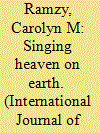| Srl | Item |
| 1 |
ID:
186631


|
|
|
|
|
| Summary/Abstract |
Uzbekistan’s first law targeting violence against women (2019) appears against the backdrop of decades of understudied resistance and struggle on the part of non-state actors, such as activists, survivors and volunteer organizers. This article draws on fieldwork, interviews and content analysis to offer examples of these continuing grassroots struggles. We situate, discuss and analyse three prevalent strategies of ‘exit’ and ‘voice’ – protest in the act of self-immolation, seeking out shelter and participation in consciousness-raising – that are variously employed by women in contemporary Uzbekistan to combat their experiences with domestic and gender violence. We frame these cases in the context of the past politicization(s) of women’s bodies and read them as portals to two examples of collective self-organizing in Samarkand, Uzbekistan – an old grassroots women’s shelter and a new digital counterpublic – calling attention to the complicated role played by privileged actors that shield such parallel and collectivized initiatives from encroachments by the state.
|
|
|
|
|
|
|
|
|
|
|
|
|
|
|
|
| 2 |
ID:
154655


|
|
|
|
|
| Summary/Abstract |
This article explores the performative politics of devotional soundscapes at Coptic Christian mūlid festivals. Echoing the state's reformist efforts in the 1990s to transform Muslim saint festivals into utilitarian spaces and their goers into “modern” Egyptian citizens, today the Coptic Church works to refashion these popular festivals from places of debauchery into morally productive spaces. Aided by affluent Cairene-based volunteers, church choirs travel from Cairo's poshest neighborhoods to these festivals to actively sing, disseminate, and teach popular religious songs (taratīl) in an effort to develop poorer Christian pilgrims into modern, pious, and more audible “citizens of heaven.” Through the analysis of one church choir's taratīl ministry at the mūlid, I illustrate how middle-class spiritual volunteers disrupt and, at times, reinscribe the Coptic Church's disciplinary efforts on the festival's poorer pilgrims, particularly as they look to modernize popular festivity into grounds of Christian ethical transformation.
|
|
|
|
|
|
|
|
|
|
|
|
|
|
|
|